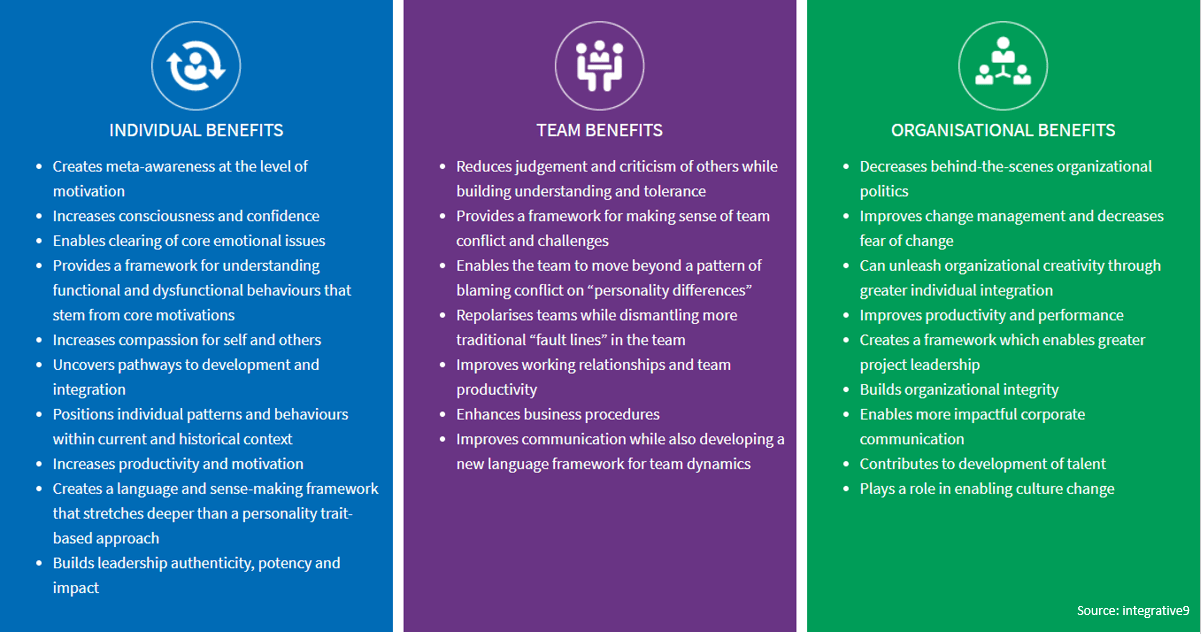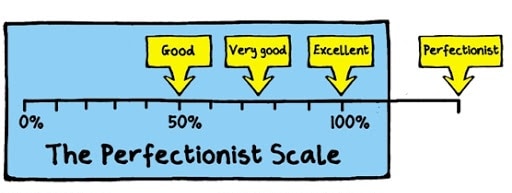Times have changed. With the millennials in the workforce, the traditional leadership style to manage the team is now obsolete. What seemed to work in the past does not work in this disruptive age. How can you stay current as a leader? What leadership styles should you adopt?
Employees are now looking more than job satisfaction, but also motivation and engagement to stay committed to the leader and the organization. How can you, as a leader ensure that you have applied the right leadership style to lead your team?
Introducing Enneagram

The Enneagram is an archetypal framework that offers in-depth insight to individuals, groups and collectives. The Enneagram refers to the nine different types or styles, with each representing a worldview and archetype that resonates with the way people think, feel and act in relation to the world, others and themselves. It is much more than a personality profile that offers insight into core personality traits, as it delves deeper into the core motivations, defence mechanisms and fears that often lie in the unconscious layers of our personality structure.
From strategic planning to leading high-performance team, Enneagram assists leaders in understanding what drives and motivates them and their team members, partners, colleagues, and competitors. You can utilise this tool to identify strengths as well as areas for improvement in your own styles, break communication barriers with others, and develop strategies for becoming more effective leaders.
Watch following 1-hour webinar on the 3 simple way to improve your leadership skills:
Benefits of Using the Enneagram
The Enneagram has, over the past decades, proved to be one of the most powerful tools in the development and coaching environment. The use of the Enneagram not only fast-tracks insight, growth and integration but also gives durability and magnitude to the development process over time.

Exploring the 9 Enneagram Types
It is important to keep in mind that different Enneagram styles may display similar behaviour. The Enneagram styles are not based on behaviour alone, and outward behaviour can be deceiving when exploring the Enneagram. To distinguish between styles, it is important to access motivation – to explore why a person chooses to act in a certain way and why acting in that way is valued by that individual.
1. Enneagram Type 1 – Strict Perfectionist

Enneagram Ones value principles and integrity and are driven by the motivational need to be good and right. Their name comes from their striving for perfection and self-control. Integrity and quality will also be important to them. Ones tend to appreciate standards, principles and structure. At their best, Ones are tolerant, self-accepting and serene, offering dignity and discernment to themselves and the world around them. Less-healthy type Ones tend to be judgmental, uncompromising and pedantic, driven by a critical gaze and an acute awareness of their own imperfections and sense of not being good enough.
2. Enneagram Type 2 – Considerate Helper

Enneagram Twos have a motivational need to be liked and appreciated. Twos value relationships and as a result kindness, generosity and self-sacrifice are important to them. Twos strive to make the world a more loving place, primarily by offering support and attention to those they care about. At their best, Twos are unconditionally supportive, able to practise self-care and offer the gift of humility to themselves and the world around them. Less-healthy Twos may seem flattering and manipulative as they ‘give to get’, motivated by a deep belief that they don’t deserve to be loved for who they are.
3. Enneagram Type 3 – Competitive Achiever

Enneagram Threes are likely to value achievement and want to be the best. As a result, efficiency, results, recognition and image are very important to them. Threes strive for success in their chosen field and tend to be highly flexible and willing to adapt to achieve their goals. At their best, others will experience Threes as hard-working, principled and receptive, offering the gifts of hope and integrity to the world. In an unhealthy state, the Three’s over-expressed need for achievement may seem self-important and inconstant. This stems from a sense of self-worth that is built on what the Three does, rather than who they are.
4. Enneagram Type 4 – Intense Creative

Enneagram Fours have the motivational need to express their uniqueness and be authentic. Fours value individualism and as a result, feelings, self-expression and purpose will be important to them. They are quite romantic at heart and appreciate the beauty and creating meaning for themselves and for others. At their best, Fours are experienced as sensitive yet content. They offer the gift of equanimity and authenticity to themselves and the world. A less healthy Four may feel misunderstood, while others experience them as melancholic and temperamental. This pattern stems from the Four’s acute awareness of their own wounds and flaws.
5. Enneagram Type 5 – Quiet Specialist
 Enneagram Fives have the motivational need to know and understand. Fives value making sense of the world around them and, as a result, objectivity and knowledge are important to them. Fives strive for independence, appreciate privacy and tend to conserve their resources to ensure future independence. At their best, others will experience Fives as visionary and mindful. They offer the gift of non-attachment to themselves and the world. At their worst, others may experience a Five as stingy, intellectually arrogant and disconnected from their heart, as they retreat into their mind to avoid being engulfed or intruded on.
Enneagram Fives have the motivational need to know and understand. Fives value making sense of the world around them and, as a result, objectivity and knowledge are important to them. Fives strive for independence, appreciate privacy and tend to conserve their resources to ensure future independence. At their best, others will experience Fives as visionary and mindful. They offer the gift of non-attachment to themselves and the world. At their worst, others may experience a Five as stingy, intellectually arrogant and disconnected from their heart, as they retreat into their mind to avoid being engulfed or intruded on.
6. Enneagram Type 6 – Loyal Sceptic

Enneagram Sixes value security and belonging, as this style stems from the motivational need to be safe and prepared. As a result, loyalty and trust are important to Sixes, who strive to be responsible and prepared at all times. At their best, Sixes are courageous and connected to a sense of inner knowing, offering the gift of devotion and trust to themselves and the world around them. Less-healthy Sixes have a tendency to worry excessively, fear letting down their defences and may be experienced as anxious, suspicious or doubting.
7. Enneagram Type 7 – Enthusiastic Visionary

Enneagram Sevens have the motivational need to experience life to the fullest and avoid pain. Sevens value a sense of freedom and focus on optimism, being inspired and taking opportunities as they present themselves. Sevens approach life as an adventure and appreciate being playful and spontaneous. At their best, others will experience Sevens as content and serene, when they are able to embrace sobriety and become present to themselves and the world around them. At a less healthy level, others may experience Sevens as impulsive, uncommitted and unfocused as they are distracted by their insatiable search for fulfilment and a fear of missing out.
8. Enneagram Type 8 – Active Controller

Enneagram Eights have a motivational need to be strong and avoid showing vulnerability. They value having a sense of control and being direct and impactful. Eights love challenges and will embody a need for justice which enables them to protect others. Healthy Eights are experienced by others as strong, deeply caring and approachable. They offer the gift of innocence to themselves and the world around them when they align with the flow of reality. At their worst, others will experience Eights as domineering, aggressive and lustful, an image that stems from the Eight strategy to express themselves as larger than life in a threatening world.
9. Enneagram Type 9 – Adaptive Peacemaker

Enneagram Nines are motivated by a need to be settled and in harmony with the world and, as a result, being accommodating and accepting will be important to them. They strive for a peaceful existence and appreciate stability, preferring to avoid conflict. At their best, Nines are experienced as self-aware and vibrant. They offer the gift of right, sustainable action to themselves and the world around them. Less-healthy Nines may be experienced as procrastinating, stubborn and self-denying. This stems from a pattern of going along to get along with others and the eventual discomfort that arises when this strategy is not satisfying.
Conclusion
Which leadership styles are you? As leadership is a fluid practice, you may find that you can sit in more than one leadership style. You’re always changing and improving the way in which you help your direct reports and the company to grow. As the Chinese proverb goes, the wise adapt themselves to circumstances, as water moulds itself to the pitcher. In order to become better leaders tomorrow, you need to know the right leadership styles to adapt according to the situation and the motivation factors of people you are leading. Attending a leadership course using Enneagram profiling tool will help you to achieve that as an agile leadership style may be the ultimate leadership style required for leading today’s talent.
Articles adapted from:

